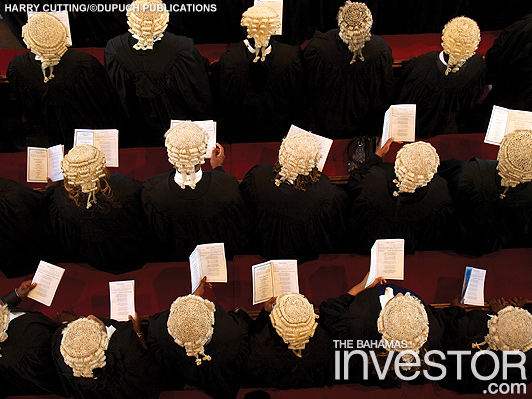| Published: Date: Updated: Author: |
The Bahamas Investor Magazine July 1, 2013 July 1, 2013 Bianca Beneby |
Available in a tax neutral jurisdiction, the Bahamian trust continues to remain an important specialist wealth and estate planning vehicle for foreign settlors concerned about growing, preserving and managing wealth for themselves and future generations. Through the enactment of relevant trust legislation, The Bahamas government, with input from industry stakeholders, has remained committed to responding swiftly and proactively to preserve the integrity and profitability of its lucrative trust business.
 In addition to important features that abound in the existing Bahamian legislation, there are several recently enacted laws that boost the scope and utility of the Bahamian trust. Such legislation has provided the platform necessary to distinguish trusts in this jurisdiction from those available in other offshore centres, while promoting the use of the Bahamian trust by foreign settlors.
In addition to important features that abound in the existing Bahamian legislation, there are several recently enacted laws that boost the scope and utility of the Bahamian trust. Such legislation has provided the platform necessary to distinguish trusts in this jurisdiction from those available in other offshore centres, while promoting the use of the Bahamian trust by foreign settlors.
Trustee (Amendment) Act, 2011 (TAA 2011)
The Trustee (Amendment) Act, 2011 is the primary piece of legislation effecting significant changes to trusts established in The Bahamas. This recent act, amending the Trustee Act, 1998, came into force December 30, 2011. Its implementation has strengthened the platform for delivery of trust services in this jurisdiction in several key areas that confer direct benefit to foreign settlors and make the administration of trusts easier for trustees:
i) Directed trusts and investment powers (81A)
As regards settlor directed trusts and investment powers, pursuant to the TAA 2011, trustees are absolved from any liability for loss where they have acted on the instructions or directions of a “power holder,” or failed to act in the absence of a direction from the power holder with responsibility for investment provided for in the trust instrument. This power holder can be a settlor.
ii) Arbitration (91A)
Also, the TAA 2011 allows for settlement of trust disputes or administration questions using arbitration where the instrument so provides. This provision will contractually bind all parties connected with the trust “and have effect as between those parties as if it were an arbitration agreement and as if those parties were parties to that agreement.”
Referring trust disputes to a process of arbitration as an alternative to oftentimes protracted trust litigation will ultimately reduce costs to the trust fund and save time for settlors and beneficiaries where disputes have arisen regarding a particular trust. Also, arbitration allows for greater privacy than open court, where for various reasons settlors may be concerned about personal information, as well as information concerning the trust’s assets becoming public. Trust disputes that have been referred to arbitration are subject to the provisions of the TAA 2011, as well as the relevant provisions of The Bahamas Arbitration Act, 2009.
iii) In terrorem or forfeiture provisions (87A)
Where a beneficiary challenges the validity of the trust or any action is taken to promote, encourage, or assist such a challenge, the interest of that beneficiary may be terminated in accordance with the trust instrument.
Moreover, this section provides that no rule of law or equity giving relief against forfeiture will be applicable in such circumstances. This forfeiture provision discourages any challenges to the validity of the trust or any of its dispositive provisions, which can ensure that the settlor’s wishes can be carried out by trustees as expressed and in accordance with the terms of the trust instrument, especially where the settlor may be deceased. However, where it can be conclusively shown that a settlor lacked the mental capacity at the time of settling the trust to do so, this may invalidate the forfeiture clause.
iv) Abolition of the perpetuity period
The TAA 2011 also provides for increasing the perpetuity period stated in the trust instrument by up to 150 years from the date of creation for existing trusts. This certainly has benefits for many trusts in existence that may be coming to an end in the near future. For beneficiaries of such trusts, the ability to extend the perpetuity period may confer tax benefits, as assets are prevented from becoming taxable in the beneficiaries’ hands.
Another key change relevant to perpetuity periods for Bahamian trusts resulted from the enactment of the Rule Against Perpetuities (Abolition) Act, 2011.
Rule Against Perpetuities (Abolition) Act, 2011 (RAPA 2011)
Prior to the passing of this act, the perpetuity period applicable to trusts in The Bahamas was 150 years. This new act abolishes the perpetuity period applicable to Bahamian trusts and will allow settlors to plan, preserve, and manage wealth for several generations yet to come. Thus, the problem of trusts coming to an end, which may have serious tax implications for settlors, will become a concern of the past.
Abolishing the perpetuity period is perhaps one of the most far-reaching and noteworthy legislative changes. Arguably, this newest development has made the Bahamian trust more competitive allowing for increased planning flexibility for settlors and for trustees who administrate Bahamian trusts.
For Bahamian trusts settled in the 1950s and ’60s, many of which are now coming to an end, trustees will be able to apply to the court to extend the perpetuity period or for retroactive application of the new law abolishing the perpetuity once this is determined to be in the best interests of the trust. The act is not automatically retroactively applicable to trusts settled prior to the enactment of the RAPA 2011–the court has the power to apply the RAPA 2011 to pre-act dispositions.
Bahamas Executive Entity Act, 2011
The executive entity (EE) is a “legal foundation established by a charter to carry on executive functions.” The EE has been designed for use as an important component in the administration and governance of fiduciary structures available in The Bahamas by performing “executive functions.” Such functions include acting as “an enforcer, protector, trustee, investment advisor and the holder of any other office or legal person (and a committee of any of the aforementioned) of any trust.” This includes acting as a settlor or founder of a trust or foundation or as an authorized applicant for a purpose trust. Under the provisions of the act, executive functions also include the ownership, management, and holding of trust assets or executive entity assets.
The future of Bahamian trusts
Despite the ongoing challenges faced by the financial services sector, The Bahamas is well on its way to maintaining its competitive edge as a premier offshore trust jurisdiction. The Bahamas has so much to offer, not only through the singular use of trusts, but also through combining the trust with other structures available as part of the suite of financial services tools offered in the jurisdiction.
As settlors’ needs continually evolve, and novel tax and regulatory initiatives are introduced across the globe, The Bahamas will need to address the changing business climate by continually revamping its trust legislation to ensure that Bahamian trusts continue to offer the greatest wealth planning advantages.
Uses and advantages of trusts in The Bahamas
Trusts are extremely versatile,and this accounts for their long-standing use in wealth management. Examples of trusts include asset protection, purpose trusts, pension trusts, voting trusts and charitable trusts. They provide the following advantages:
- Flexibility in the distribution of the client’s assets following his or her death;
- Wealth preservation for the next generation;
- Separation of income benefits from capital;
- Avoidance of lengthy and complicated probate court procedures;
- Retention of shares for employees;
- Confidentiality;
- Maintenance of property for those who cannot hold it for themselves, eg minors;
- Avoidance of disputes among heirs and beneficiaries by securing the services of an impartial person to administer assets; and
- Protection of property and assets from legal and political actions that may be taken against the settlor and beneficiaries by transferring legal ownership to the trustee.










